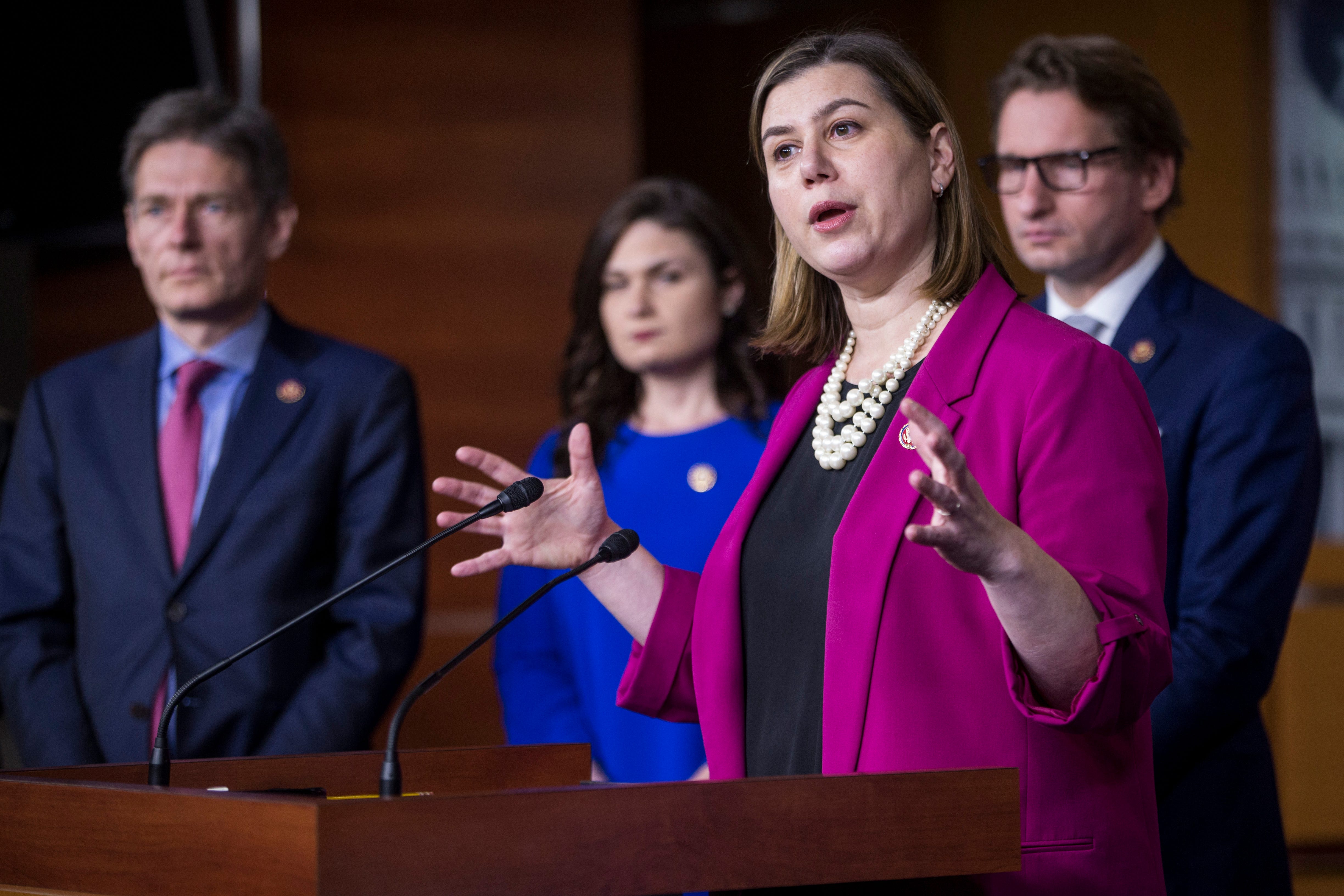House passes Democrats' campaign finance, voting rights bill
 Melissa Nann Burke
Melissa Nann Burke
Washington — The Democrat-controlled House split along party lines Friday to approve a sweeping campaign finance, voting rights and ethics reform bill that will be dead on arrival in the U.S. Senate.
The For the People Act, which passed by a vote 234-193, aims to weaken the influence of wealthy political donors, reduce government corruption and impose electoral reforms.
But Republicans criticized the legislation as partisan, arguing it would stifle political speech, endorse public financing of federal campaigns and give the federal government too much control over local elections.
Senate Majority Leader Mitch McConnell, the Kentucky Republican who has long scoffed at campaign finance reform, has vowed not to bring up the bill for a vote in his chamber.
The legislation is still a top priority for freshman Rep. Elissa Slotkin, D-Holly, who campaigned on government reform and refused donations from corporate political action committees.
Slotkin has championed elements of the bill, including requiring the disclosure of all political spending and ensuring foreign money may not influence U.S. elections.
Last fall, she helped lead a group of over 100 Democratic candidates asking House leaders to make the legislation the new Congress' first order of business.
Even if the Senate never takes up the legislation, she said pieces of the bill will likely be broken off into measures that will ultimately become law because they have bipartisan support.
"The overwhelming message I heard for a long time on the campaign trail was Washington's broken. Both parties are broken. The system is off because money in politics is what's driving everybody in D.C.," Slotkin said.
"It was a blanket criticism, and it was from both sides of the aisle."
A former Central Intelligence Agency officer and Pentagon official, Slotkin said it's a threat to democracy when people step away from the system because they "feel that both parties are corrupt and that their vote doesn't matter." That was something she said she often heard from Michigan State University students in her district.
U.S. Rep. Fred Upton, R-St. Joseph, has slammed the bill as "not bipartisan," even though he's long supported campaign finance reform.
"There are plenty of flaws in the current system. That is for sure. And we need to fix it," Upton said during debate.
"But you know what? We have a Democratic House and we have a Republican Senate, and the only way that we are reasonably going to fix this issue is with a bipartisan bill."
Targeting Russian influence
Michigan's 14 congressional races attracted a $80 million in campaign donations and outside spending in 2018, according to an analysis the Michigan Campaign Finance Network.
Slotkin's race against incumbent GOP Rep. Mike Bishop broke a state record by attracting a combined $28.3 million.
She noted that it was impossible to know who funded many of the attack ads run against her on Detroit TV stations because of weak disclosure rules for super political action committees.
"People are just kind of feeling disgusted with the tone of politics, and negative ads just contributed to that overall negative tone," Slotkin said.
Slotkin pushed for an amendment, adopted Thursday night, to close loopholes that allow foreign actors to purchase digital, television or radio ads to influence elections — a concern stemming from the Russian influence in online ads during the 2016 election.
"It's absolutely bonkers that foreign governments, foreign nationals, foreign companies can buy ads that influence our political process. That's bonkers. They can't donate to our campaigns, so they shouldn't be able to buy ads influence our campaigns," she said.
"Secondly, we know that Michigan was one of the targeted states where a large number of these exact ads were focused. So, it plays on both my interest as a national security person and just as a Michigander."
Slotkin was referring to Russian-bought Facebook ads, some containing anti-Muslim messages, that were intended to sow discord and disproportionately targeted Michigan and Wisconsin in 2016, among other states.
Slotkin's amendment, she said, is one piece of the overall legislation she would like to introduce separately, knowing it would get bipartisan co-sponsors.
"I want it to have a real chance of passing in the Senate," she said. "I'm a pragmatist. I know that there are certain parts of HR1 that Sen. McConnell is unlikely to like, but I'd rather make some progress, then not try it all on issues like returning integrity to our system."
McConnell has argued in part that the House Democrats' overall bill would impose potentially unconstitutional restrictions on political speech.
"It aims to give Washington, D.C., vast new control over elections, give tax dollars to political campaigns and give election lawyers more opportunities to determine the outcome of elections," he said Thursday on the Senate floor.
Taxpayer subsidies criticized
Upton and other Republicans also objected to a provision creating a publicly financed matching system to enhance small campaign donations — a move intended to minimize the influence of large donors and super PACs.
The legislation initially tapped taxpayer appropriations to pay for the public financing provisions; however, the final version assessed a 2.75 percent fee on certain civil and criminal fines.
"If you do a poll today across the country, you are going to find that most voters are going say campaigns are too expensive, too negative and yes, they are too long," Upton said during debate.
"We are going to have thousands of candidates running for Congress. They are all going to be eligible for this match from the Treasury for any contribution under $200 with a 6-to-1 ratio. So, we are going to have more money in politics, and we are not going to have the transparency that I think all of us want."
The Democrats' package incorporated a stand-alone bill by Rep. Andy Levin, D-Bloomfield Township, called the Transparency in Corporate Political Spending Act.
He says it would reverse a law preventing the U.S. Securities and Exchange Commission from requiring corporations to disclose political spending to their shareholders.
“The only reason that the law my measure will reverse is on the books is that for years conservatives in Congress have misused the appropriations process to enact anti-transparency measures contrary to our most fundamental democratic values,” Levin said.
“I cannot for the life of me, understand why my colleagues on the other side of the aisle seem so keen on helping corporations keep their political spending secret. How is that helpful for democracy?”
Rep. Rashida Tlaib, D-Detroit, praised the legislation for targeting voter disenfranchisement affecting communities of color including Michigan's 13th District.
"We must acknowledge this injustice and remedy it immediately," she said on the House floor.
The bill includes new requirements for early voting, same-day voter registration for federal elections, and online voter registration. It would make Election Day a federal holiday and calls for nonpartisan redistricting commissions.
Tlaib also highlighted the bill's provision requiring that the president and vice president divest from their businesses — something she has long criticized President Donald Trump for.
"I commend my colleagues for the additional language requiring both that language for the executive branch, trading individual stocks and so forth," she said.
mburke@detroitnews.com